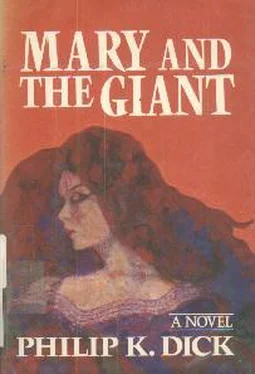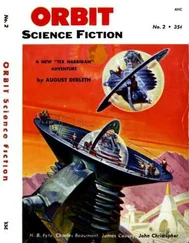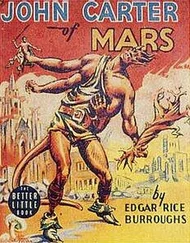Philip Dick - Mary And The Giant
Здесь есть возможность читать онлайн «Philip Dick - Mary And The Giant» весь текст электронной книги совершенно бесплатно (целиком полную версию без сокращений). В некоторых случаях можно слушать аудио, скачать через торрент в формате fb2 и присутствует краткое содержание. Жанр: Фантастика и фэнтези, на английском языке. Описание произведения, (предисловие) а так же отзывы посетителей доступны на портале библиотеки ЛибКат.
- Название:Mary And The Giant
- Автор:
- Жанр:
- Год:неизвестен
- ISBN:нет данных
- Рейтинг книги:4 / 5. Голосов: 1
-
Избранное:Добавить в избранное
- Отзывы:
-
Ваша оценка:
- 80
- 1
- 2
- 3
- 4
- 5
Mary And The Giant: краткое содержание, описание и аннотация
Предлагаем к чтению аннотацию, описание, краткое содержание или предисловие (зависит от того, что написал сам автор книги «Mary And The Giant»). Если вы не нашли необходимую информацию о книге — напишите в комментариях, мы постараемся отыскать её.
Mary And The Giant — читать онлайн бесплатно полную книгу (весь текст) целиком
Ниже представлен текст книги, разбитый по страницам. Система сохранения места последней прочитанной страницы, позволяет с удобством читать онлайн бесплатно книгу «Mary And The Giant», без необходимости каждый раз заново искать на чём Вы остановились. Поставьте закладку, и сможете в любой момент перейти на страницу, на которой закончили чтение.
Интервал:
Закладка:
"That's what Nitz is doing," Mary Anne said.
"Nitz? What's that?"
"Paul Nitz, in the booth. He never heard any of that serious music before."
"My Point," Schilling said sharply, "is that whenever a buyer is introduced to a new field by a salesperson, the buyer becomes dependent on that salesperson. That means you have a responsibility not to sell the buyer short by simply pushing merchandise on him for the sake of getting rid of it. That's where this business becomes an art with standards. We're not selling gum or soda pop-we're selling, to some people at least, elements that make up a way of life."
"What's the name of that?" Mary Anne asked. "That music he's playing."
"What are you talking about?" The girl was paying no attention to him. "Miss Reynolds," he said, "have you heard anything I've said?"
"Of course I have," she answered, industriously dusting. "You said I have to know what it is we're selling. But I can't learn that overnight ... you're going to have to help me."
"Do you want to find out what's on these records? Do you care?"
"Yes, I care."
"Listen to what your friend is playing." The rattle of a Chavez percussion experiment was audible. "Can you honestly tell me you like that? Damn it," he protested, "stop that dusting. You don't like that kind of music; it doesn't mean anything to you."
"It's terrible," Mary Anne agreed.
In despair, Schilling said: "Then what can I do with you? I can't make you like it."
She scrutinized him shrewdly. "Do you like it?"
"No," he admitted. "I don't care for experiments in pure sound."
"What do you like, then?"
"I'm a vocal collector. I'm interested in lieder."
"But you can sell this stuff." She resumed her dusting. "Do you really believe music is important?"
"Well," Schilling said, "it's my whole life."
"Your whole life?" Again she fixed her intense eyes on him. "You mean there's nothing more important to you than music?"
"That's what I mean," he said, with a stir of belligerence. There was no comment from the girl; she heard and accepted his statement, filed it away somewhere in her mind. "Why not?" he demanded, following her around as she dusted.
"That's the way it is with Paul. Sometimes I wish I had something like that."
"Why not?"
She shrugged. "No reason, I guess. Except that around here, this town-well, who ever heard of that stuff you gave Paul? He never heard of it, and he's a musician."
"That's why I came here. That's why I settled here."
"Anyone who would live here is a moron."
"Am I a moron for coming here?"
"I mean somebody growing up here, not seeing anything, not knowing anything. Like Jake Lovett. Like Dave Gordon ... all the rest of them. Drinking malts, hanging around the drugstores and gas stations. But you're different. You've seen enough to know what you want and what you enjoy. You came from outside."
She had stopped dusting; now she stood deep in thought. Joseph Schilling went over and firmly took the dust cloth from her. Taking her hand, he led her over to the counter and stationed her behind it. She went obediently.
"Now, Miss Reynolds," he said, "you listen to what I'm going to tell you. We're going over the mechanics of selling a record."
She nodded.
"All right." He laid an LP down on the counter before her. "I'd like to buy that; I'm an elderly customer. What's your first step?"
Mary Anne picked up the record and gazed at the brightly colored jacket with its drawing of violins. "What is it?" Lips moving, she worked out the composer's name. "Prokofiev."
"We're selling the record; this has nothing to do with the music. What do you do when a customer brings his purchase to the counter?"
Mary Anne groped under the counter and found a record bag.
"No," Schilling said, "first you examine the record to make certain it isn't scratched." He showed her how to draw the record from its envelope and hold it by the edges. "See?"
She did so.
"What next?" he asked, again laying the record down.
"Then," she said, "I put it in the bag."
"No, then you write up a sales slip. So we can get the customer's name and address." He presented her with a mechanical pencil and showed her how to use the machine that rolled out duplicate sales slips. "Then," he said, "you put the record and his copy of the slip in the bag. Our copy goes on that spindle." He did that for her, too.
Mary Anne slid the LP into the bag and folded the handle. Suddenly she looked up at Schilling and gave him the warmest Smile he had ever seen in his life. "Thank you," she said, and pushed the record bag across the counter.
"What?" he murmured.
Still smiling, she gave a little half-curtsy. "Thank you for buying the record."
Gruffly, Schilling said: "You're welcome."
She continued to smile at him, a sweet and utterly guileless glow that charmed him and, at the same time, made him uncertain of himself. "The next step," he went on, "is the cash register. You suppose you can work it?"
She didn't answer immediately. "Sure," she said, at last. "What else?" He couldn't seem to collect his mind. "Do you know where to find record prices?"
"No."
He got the Schwann LP catalogue open and showed her the price list at the back. "They're all here. Until you've learned them, always look them up."
"Would you like to buy another record?" she asked.
"No," he said, "one is fine, thanks."
From a nearby pile, she selected the top record. "Buy this."
She read the title. "Schubert Piano Music for Four Hands. Buy that ... it's pretty."
"Is it?"
"Yes," she said, "very pretty."
"Maybe I will, then."
"Want me to put it on the phonograph for you?"
"Yes," he said, with a kind of eagerness.
She stuck her tongue out at him. "Put it on the phonograph yourself; you're grown up."
Schilling laughed unsteadily. "Apparently you'll do all right."
With a flounce of dismissal, Mary Anne went to get her dust rag.
At four-thirty Paul Nitz emerged from the smoke-drenched record booth, loaded down with records, which he deposited on the counter. "Thanks," he said to Schilling.
"Did you enjoy them?"
"Yeah," he said. "Some of them."
Schilling began grouping the records by brand. "Why don't you come around Sunday? I'll be playing some new Virgil Thomson.
Nitz was fumbling in his pocket. "I'll buy that top one there."
"Paul," Mary Anne said sharply, "you don't have a phonograph."
Nitz hung his head. "That has nothing to do with it."
Dropping the stock covers she had been making out, Mary Anne hurried over and took the record away from Nitz. "You can't do it; I know what you're going to do, you're going to just sit home and look at it. What'll looking at it do for you?"
Nitz muttered: "You sure are bossy, Mary Anne."
"I'll put it under the counter," she told him. "You go buy a phonograph; when you have a phonograph, come back and get your record."
Schilling stood watching as she pushed the man out of the store and onto the sidewalk. The episode, to him, had a fabulous and unreal quality; it could not really happen in a store. In its own way, it seemed funny.
"He has to go to work," Mary Anne explained, hurrying back inside. "He plays bop piano over at the Wren."
"You cost me a sale," Schilling said, feeling still a little bewildered.
"Look ... if he bought that record he would have just gone home and sat looking at it. I know him; take my word. He never would have bought any more records; now he'll go get a phonograph and then he'll buy records all the time."
"Either you're very far sighted," he said, "or you're an exceptionally fast talker. Which is it?"
They faced each other.
"Don't you trust me?" she inquired.
He smiled grudgingly. "Some. But you're too intricate for me."
Читать дальшеИнтервал:
Закладка:
Похожие книги на «Mary And The Giant»
Представляем Вашему вниманию похожие книги на «Mary And The Giant» списком для выбора. Мы отобрали схожую по названию и смыслу литературу в надежде предоставить читателям больше вариантов отыскать новые, интересные, ещё непрочитанные произведения.
Обсуждение, отзывы о книге «Mary And The Giant» и просто собственные мнения читателей. Оставьте ваши комментарии, напишите, что Вы думаете о произведении, его смысле или главных героях. Укажите что конкретно понравилось, а что нет, и почему Вы так считаете.










